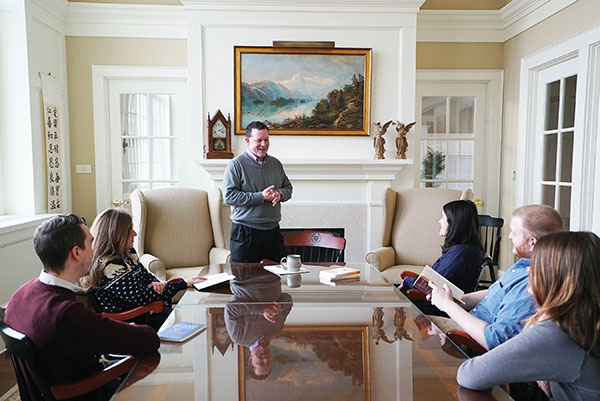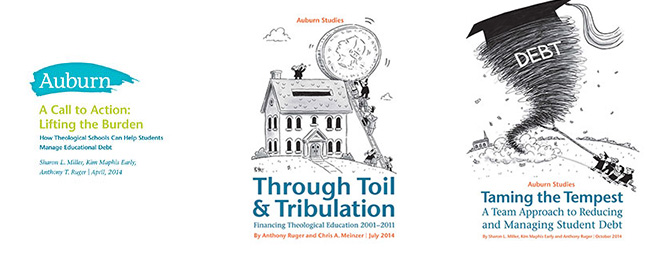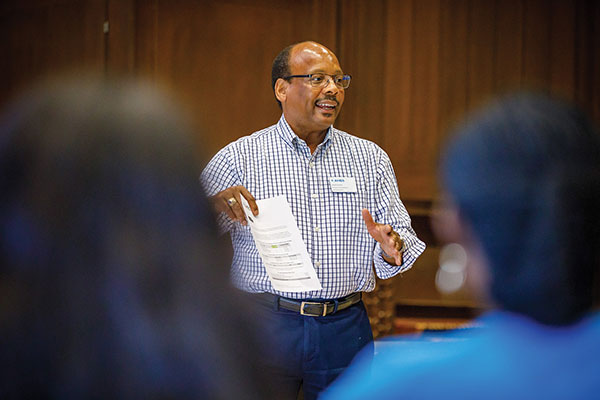
When Reginald Boyd started the master of divinity program at Hood Theological Seminary in 2004, he felt called to be at seminary. That call sustained him through his divinity studies as well as his work toward the doctor of ministry degree, which he received from Hood in 2014.
Now, as the seminary’s director of recruitment and admissions, Boyd can speak personally to prospective students about what it means to be a student at Hood — the supportive faculty, the diverse community, and the impact that his education has had on his own work as a pastor. But he can also speak to something else that prospective students need to hear: “I know firsthand what it means to enter the seminary and not know how you’re going to pay for it,” says Boyd.
He works with prospective students to make sure they are not in that same boat. When they visit campus, he makes sure they understand the cost of attendance, gives them a link to the webpage that lists available scholarships, requires them to know exactly how much debt they are already carrying, and encourages them to create a budget if they don’t already have one. He works closely with his predecessor, Angela Davis-Baxter, who is now the director of financial aid after eight years as director of admissions.
Davis-Baxter’s shift from the admissions office to the financial aid office has influenced her perspective. “I see financial aid as an important part of the initial process of discerning theological education,” she says. “If prospective students know how they’re going to pay for it, they’re more willing to go ahead with the rest of the admissions process.”
For years, many theological school students — and the schools themselves — had a God-will-provide attitude when it came to paying for their education. But in the wake of rising costs, increased undergraduate indebtedness, less financial support from some denominations, and other trends in theological education and in higher education as a whole, prospective students are often less willing to take on educational debt than their counterparts from a decade or two ago. Admissions officers field more questions from prospective students about how to afford a seminary education, and they often preempt those questions by directly addressing finances early in the process of working with prospective students.
But recruiters also know that early conversations about money may lead some students to postpone enrollment or opt to go elsewhere, depending on the financial resources available, and that affects their ability to attract the greatest number of well-matched students to their institution.
“We talk with prospects about finances as early as possible, so that the financial aid and admissions processes are almost parallel,” says Ruth-Aimée Belonni-Rosario, dean of admissions at Lancaster Theological Seminary. Admissions team members discuss with prospective students not just the cost of attendance, but the student’s responsibility to talk with their sending congregation and denomination about funding assistance and to pursue outside scholarships. Lancaster’s open house events include a financial aid presentation and an opportunity to talk one-on-one with the school’s loan officer.
The parallel path toward admission and financial aid also takes place at Gordon-Conwell Theological Seminary. “The cost of attendance is one of the first things people ask our admission reps about,” says Stacey L. Glidden, director of student financial services. “So they talk considerably about scholarships, the cost of housing, and the availability of part-time employment.” Reginald Boyd hears the same thing when he’s out recruiting for Hood. “I tell them to check out scholarship opportunities first, before they do the FAFSA,” he says, referring to the Free Application for Federal Student Aid.
Of course, there is a fine line between talking about finances early and talking about it too early. “It’s something that’s clearly communicated before they enroll, but it’s not the first conversation we have with prospective students,” says Daniel Grimes, director of enrollment and financial aid at Anabaptist Mennonite Biblical Seminary (AMBS). “We don’t want them to have an undue fear that seminary is unaffordable. We don’t want to chase people away.”
 |
"The cost of attendance is one of the first things people ask our admission reps about," says Stacey L. Glidden (center), director of student financial services at Gordon-Conwell Theological Seminary.
Credit: Gordon-Conwell Theological Seminary |
Research and resources
The last five years have seen an upswing, both in research and in resources that admissions officers can tap into as they talk with prospective students about how to afford a seminary education. In 2012, the Association of Theological Schools launched its Economic Challenges Facing Future Ministers (ECFFM) initiative. Funded by Lilly Endowment Inc., ECFFM supports programs at 67 theological schools that run the gamut from financial literacy workshops to financial mentorship programs and financial counseling — all efforts to research and decrease the economic burdens on students or alumni.
In 2014, three reports from Auburn Seminary’s Center for the Study of Theological Education documented the specifics of student debt and chronicled its consequences for seminary graduates. Titled A Call to Action: Lifting the Burden, Through Toil and Tribulation, and Taming the Tempest, the reports also proposed strategies to combat the growing trend of borrowing.
While the ECFFM programs primarily benefit current students and Auburn’s research has focused on alumni, the energy around the topic is helping to shift conversations about money earlier, long before a student’s first bill comes due.
|

|
|
Available from Auburn Seminary
|
-
A Call to Action: Lifting the Burden: How Theological Schools Can Help Students Manage Educational Debt (April 2014).
Online at bit.ly/Lifting-the-burden.
-
Through Toil and Tribulation: Financing Theological Education 2001–2011 (July 2014).
Online at bit.ly/Toil-and-tribulation.
-
Taming the Tempest: A Team Approach to Reducing and Managing Student Debt (October 2014).
Online at bit.ly/Taming-Tempest.
|
The line between talking finances and counseling
The Lancaster admissions team does not provide financial counseling to prospective students, Belonni-Rosario emphasizes — there’s a difference between being direct about the financial realities of attending seminary and doing the in-depth work of one-on-one financial counseling. She and her colleagues don’t know, for example, a student’s credit card debt or housing expenses. But if students apply for federal financial aid, the school has access to their educational indebtedness. And the admissions team encourages applicants to take all of that into account as they consider their ability to finance their education.
As part of its ECFFM project, Central Baptist Theological Seminary does offer financial counseling — to current students, not prospective ones, and not through the admissions office. Angela Barker Jackson is the program director of Central’s Money and Ministry program, which began in January 2017. One outcome of having these resources for current students is that prospective students also get a sense of the seminary’s philosophy about money.
Jackson worked with Central’s recruiters, the associate dean for student success, and the vice president for marketing to hammer out what language to use with current and prospective students about the financial component of theological education. “We talk about how Central is concerned with whole-person ministry formation, and financial wellness is part of that. We communicate our desire for students to graduate and not be encumbered by a debt load that will affect their ministry.”
Once prospective students are admitted, Jackson sends letters welcoming them to the community, introducing herself and the Money and Ministry program, and inviting them to meet with her for required one-on-one conversations once they’ve enrolled. They get the message well before matriculation that Central prioritizes financial wellness as part of ministerial preparation.
Promoting frugality
“We are really trying to reduce student debt,” says Hope T. Benko, director of enrollment management at Seminary of the Southwest. To that end, prospective students who visit campus meet with an enrollment staff member to go over costs of attending, available scholarships, and other sources of funding, including crowdfunding and peer-to-peer fundraising campaigns. Once they enroll and arrive on campus, Benko meets with each new student to review their award letter and the billing process. “Some students were borrowing the full amount they were allowed without understanding what they really needed,” says Benko. The individual meetings are an early opportunity for her to allay financial fears and communicate the school’s goal of reducing student debt.
Lancaster’s message for new students, Belonni-Rosario says, is to “live like a student.” Part of that is being open to learning about how to handle their finances. “We want to provide them with as much knowledge as possible early on, whether that means how to make a budget or how to get a deferment for undergraduate loans.”
And while undergraduate debts are a reality for many seminary students, most don’t want to pile on more for graduate school. “Ten years ago, students seemed more accepting of student loans,” says Gordon-Conwell’s Glidden. “Now students are a little more leery of taking them out.”
 |
"We don't want them to have an undue fear that seminary is unaffordable," says Daniel Grimes, director of enrollment and financial aid at Anabaptist Mennonite Biblical Seminary. "We don't want to chase people away."
Credit: Peter Ringenberg |
It’s the same thing at Duke Divinity School. When Cassandra Pettigrew started in her role as director of financial aid three years ago, she saw students who were excited about being admitted and willing to take out the loans to attend. “We were only talking about how students could pay for their education,” says Pettigrew, who worked in other financial aid offices for nearly two decades before she arrived at Duke Divinity. Now, she says, more students seem to have a greater concern about finances. Part of that may have to do with the work she and her colleagues in admissions have done to update the conversation around financial aid. Her office now sends what they call the “Affording Duke” letter to accepted students a week after they receive their admission packet. The letter highlights institutional scholarships, grants, and other sources of free money to consider before accessing loans. “Our emphasis now is really on using less debt,” says Pettigrew.
At AMBS, Grimes encourages prospective and current students to minimize their borrowing and consider alternatives to loans. He also reports information about AMBS students’ debt load to the school’s board of directors, including how the current year’s numbers compare to the previous year. “Board members need to know the amount of educational debt their students are carrying,” he says.
This cumulative focus on avoiding student debt may be having an impact. Last year, in its annual survey of theological school graduates, ATS saw the first decrease since 2010 in the percentage of students borrowing more than $40,000 — along with a corresponding increase in the percentage of students not accessing student loans. But half of all students across ATS member schools still use loans to finance graduate theological education, so the struggle remains.
When finances keep a prospective student away
Unsurprisingly, when prospective students pay close attention to finances, some decide to postpone enrollment until they are in a better financial position, and others choose to attend a school where their cost will be less. “On the enrollment side of things, we would see that as a loss, clearly,” says Grimes, but he says that if finances are truly the only thing holding a prospective student from enrolling, usually they are able to work out an arrangement.
Recently Seminary of the Southwest had a few students defer enrollment out of financial concern. “I did feel good about that,” says Benko. “It doesn’t help us reach our admissions goals, but I want them to be here when they’re ready. By the time these students have been accepted, we really have a relationship with them, and we know they will be excellent students. If it takes another semester or year of saving and planning, I’m glad for them to take that time.”
It’s more difficult when a student chooses another school based on funding. “You don’t want money to be the thing that causes students to go elsewhere if they’re the right fit for your school,” Benko says. “We’re really working hard to increase what the seminary can offer, but it sometimes happens, and it’s a little heartbreaking when it does.”
Like Benko, Belonni-Rosario is often encouraged by a decision to defer enrollment based on finances. “Having a prospect say to me, ‘I can’t afford this right now but I need to work and save money to do it’— that’s actually a good thing, and I view it as a success,” says Belonni-Rosario. But taking that view can be challenging, especially in a time of decreasing enrollment. She tries to keep the long view, remembering that even graduates who find full-time employment in ministry will likely struggle to pay back student loans. “It’s almost an ethical question, a Christian question. These are people who want to be our pastors. How are we going to care for them? It starts now.”
Seminarians learn fundraising while decreasing debt
While prospective students might be comfortable asking recruiters about scholarship aid or other cost-of-attendance information, they can feel downright awkward talking about their own finances or asking others for money. “People interested in attending seminary, who want to go into ministry, often don’t want to talk about money,” says Ruth-Aimée Belonni-Rosario, dean of admissions at Lancaster Theological Seminary. “It’s uncomfortable. But we want them to be able to talk about it. It affects you, your family, your congregation. You need to be able to talk about it.”
This year at Gordon-Conwell Theological Seminary, 175 students are participating in the Partnership Program, a scholarship program that requires students to learn stewardship and fundraising skills, which they put into practice by engaging with donors to Gordon-Conwell’s Education Fund in support of the Partnership Program. The program started offering partial scholarships in 2004 and moved to full-tuition scholarships in 2012. It emphasizes the importance of becoming good stewards of both personal and church finances.
As part of its participation in the Economic Challenges Facing Future Ministers initiative, Gordon- Conwell undertook a systematic study of the Partnership Program and its impact, both on the students who received the scholarship and on the school itself. “It’s been really eye-opening,” says Stacey L. Glidden, director of student financial services. “The amount of loan debt that students who were part of the Partnership Program accrued was significantly less than students who were not a part of the program. It’s also been a great way to get people out of their comfort zones, to talk about money and where God is leading them.” It has financially benefitted the institution, as well, he says.
At Anabaptist Mennonite Biblical Seminary, financial aid director Daniel Grimes tells every student and prospective student who comes though his door that they need to ask their congregation or other ministries they are involved in to help finance their education. “I say, ‘It may be uncomfortable, but you really need to ask them because if you don’t, you’re denying them the blessing of supporting people in ministry.’”
Duke Divinity School also encourages incoming and current M.Div. students to participate in the Celebrating God’s Call scholarship program, in which students who raise up to $1,000 from their local congregation receive a matching grant from the school.